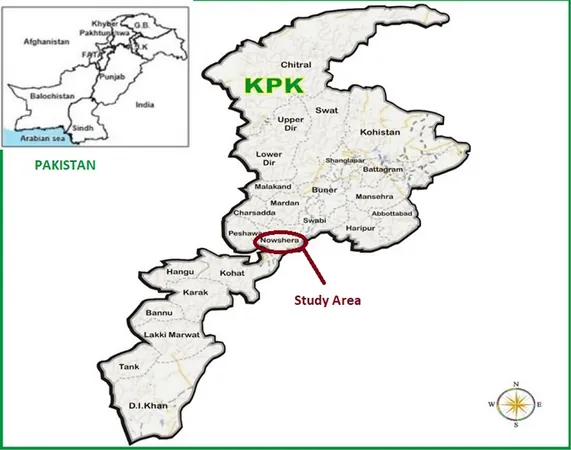
Unveiling the Genetic Secrets of Malaria: Insights from Nowshera, Pakistan
2024-11-26
Author: Li
The Fight Against Malaria: A Looming Health Crisis
In the battle against malaria, understanding the genetic diversity of its parasites is paramount. For the first time, a groundbreaking study has revealed remarkable insights into the genetic landscape of Plasmodium falciparum and Plasmodium vivax field isolates from the Nowshera district of Khyber Pakhtunkhwa, Pakistan. This research not only sheds light on the pathogens responsible for the considerable malaria burden in the region but also highlights their ability to adapt, develop drug resistance, and evade the human immune response.
A Deep Dive into the Research Methods
The study, conducted between March and August 2019, involved collecting blood samples from 124 patients diagnosed with uncomplicated malaria in various hospitals in Nowshera. The team focused on specific genes: Pfmsp1 and Pfmsp2 for P. falciparum, and the Pvmsp-3α gene in P. vivax isolates. Utilizing advanced molecular techniques like nested PCR and allele-specific analysis, researchers characterized the genetic diversity of these malaria parasites.
Key Findings that Will Shock You!
- Diversity of P. falciparum: Out of the analyzed P. falciparum isolates, a staggering 21 distinct alleles were found, including 14 from the Pfmsp-1 gene and 7 from the Pfmsp-2 gene. Notably, the MAD20 sub-allelic family emerged as the most prevalent, observed in 50% of the isolates. - P. vivax Variants Galore: On the P. vivax front, researchers identified 4 major allelic variants of the Pvmsp-3α gene. Not only that, but they also discovered 9 sub-allelic variants during restriction fragment length polymorphism (RFLP) analysis, showcasing the complex genetic makeup of this parasite. - Multiplicity of Infections: The study provided insights into the multiplicity of infections (MOI), calculating an average MOI of 1.34, indicating moderate transmission intensity. This metric serves as a critical indicator of the number of distinct parasite clones present in the host.
Malaria in Pakistan: A Threat Too Familiar
Despite concerted efforts and resources allocated toward controlling malaria, the disease continues to pose a grave threat to public health in Pakistan. The World Health Organization reported approximately 2.65 million malaria cases in the country in 2022, indicating a pressing need for effective control measures. Interestingly, P. falciparum, known for being the most deadly malaria parasite, is predominantly found in sub-Saharan Africa, while P. vivax is more widespread, particularly in Asia and the Americas. Recent advancements in research have shown that P. vivax can cause severe malaria, revising its previously benign classification.
The Need for Action and Future Strategies
The findings from this study are crucial in framing future malaria control policies. With malaria being complex and dynamic, understanding its genetic diversity allows for the development of targeted control strategies, vaccine development, and a better understanding of how these parasites evolve. Significantly, merozoite surface proteins such as Pfmsp-1, Pfmsp-2, Pvmsp-3α, and Pvmsp-3β have emerged as prime candidates for vaccine development, an area that requires further exploration. Ensuring that research continues in this domain may lead to breakthroughs in vaccine efficacy and malaria control.
Conclusion: A Call for Continued Research
The intricate dance of malaria parasites with human biology in Pakistan necessitates ongoing research. With only a limited understanding of the genetic diversity in P. falciparum and P. vivax from Nowshera, this study serves as a stepping stone for future inquiries that could significantly aid in combating this devastating illness in one of the world’s malaria hotspots. As researchers dig deeper into the genetic complexities of malaria, we must remain vigilant and proactive in addressing the challenges posed by this ancient disease. Could new insights into parasite genetics hold the keys to eradicating malaria once and for all? Only time will tell. Stay tuned for more groundbreaking discoveries in the fight against malaria and its impact on global health!

 Brasil (PT)
Brasil (PT)
 Canada (EN)
Canada (EN)
 Chile (ES)
Chile (ES)
 Česko (CS)
Česko (CS)
 대한민국 (KO)
대한민국 (KO)
 España (ES)
España (ES)
 France (FR)
France (FR)
 Hong Kong (EN)
Hong Kong (EN)
 Italia (IT)
Italia (IT)
 日本 (JA)
日本 (JA)
 Magyarország (HU)
Magyarország (HU)
 Norge (NO)
Norge (NO)
 Polska (PL)
Polska (PL)
 Schweiz (DE)
Schweiz (DE)
 Singapore (EN)
Singapore (EN)
 Sverige (SV)
Sverige (SV)
 Suomi (FI)
Suomi (FI)
 Türkiye (TR)
Türkiye (TR)
 الإمارات العربية المتحدة (AR)
الإمارات العربية المتحدة (AR)